You can effectively combat inflammation by crafting a powerful herbal tea blend that harnesses nature's healing properties. Start with a base like chamomile or peppermint, and then add anti-inflammatory heroes like turmeric and ginger. Turmeric contains curcumin, which blocks inflammatory pathways, while ginger fights swelling and pain. Use a balance of flavors for a pleasant cup. Brew your blend with water just below boiling and steep for 5-10 minutes to avoid bitterness. Regularly enjoying this tea not only targets inflammation but also boosts your overall health. There's much more to explore about the benefits of these herbal ingredients.
Understanding Inflammation
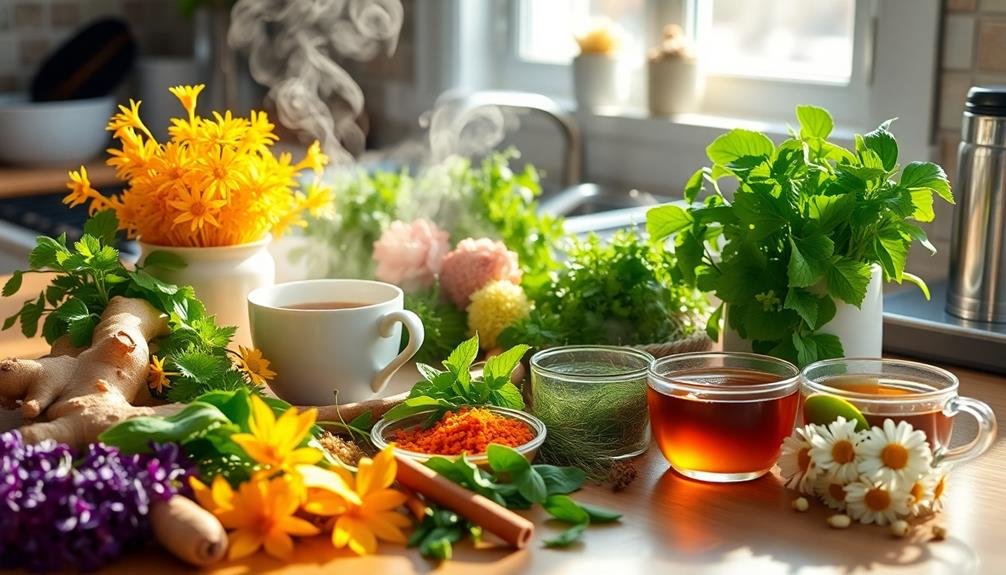
Inflammation is your body's natural response to injury or infection, acting as a defense mechanism to promote healing. When you encounter harmful stimuli, like pathogens or damaged cells, your immune system kicks into gear. It sends out signals that increase blood flow to the affected area, leading to redness, warmth, swelling, and pain.
While this process is fundamental for recovery, chronic inflammation can be detrimental to your health.
If you're dealing with ongoing inflammation, it's important to understand its underlying causes. Factors like stress, poor diet, and lack of exercise can contribute to persistent inflammation. You might notice symptoms like joint pain, fatigue, or digestive issues. Recognizing these signs can help you take action before they escalate.
In your journey to better health, managing inflammation is essential. You'll want to focus on lifestyle changes that promote balance in your body. Incorporating anti-inflammatory foods, staying active, and managing stress are all effective strategies.
Key Herbs for Healing
When you're looking to combat inflammation naturally, certain herbs can play a key role in your healing journey. Integrating these powerful herbs into your routine can help reduce inflammation and promote overall wellness.
Here are three key herbs to take into account:
- Turmeric: Known for its active compound, curcumin, turmeric is a potent anti-inflammatory agent. It helps block inflammatory pathways, making it essential for managing inflammation.
- Ginger: This root has been used for centuries to alleviate various ailments. Its anti-inflammatory properties come from compounds called gingerols, which can help reduce swelling and pain.
- Boswellia: Also known as frankincense, boswellia has shown promise in reducing inflammation, particularly in conditions like arthritis. Its active ingredients can inhibit inflammatory enzymes, offering relief.
Incorporating these herbs into your daily routine, whether through teas, supplements, or cooking, can greatly enhance your body's ability to fight inflammation.
Crafting Your Tea Blend
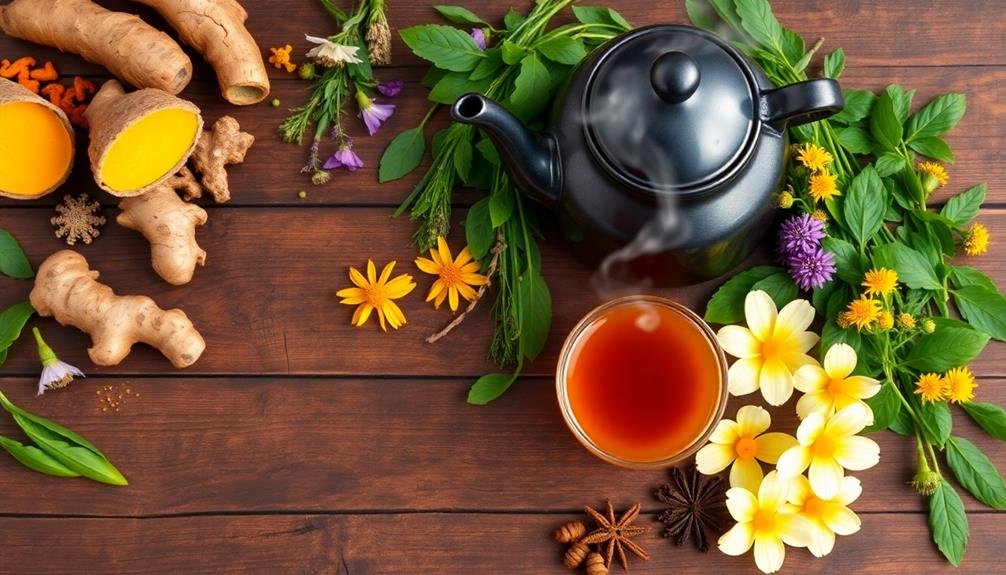
Creating your own herbal tea blend can be a rewarding way to harness the healing properties of key herbs. Start by selecting a base herb, like chamomile or peppermint, which serves as the foundation of your blend.
Next, choose one or two anti-inflammatory herbs, such as turmeric or ginger, to enhance the blend's health benefits. Remember, the ratios matter; you'll want to balance stronger flavors with milder ones.
Consider adding a few herbs for their unique properties—like cinnamon for its warming effects or lemon balm for a calming touch. Aim for a harmonious mix where no single herb overpowers the others.
Once you've chosen your ingredients, measure them out. A good starting point is one part base herb to one part each of your chosen anti-inflammatory herbs and any additional herbs.
Adjust according to your taste preferences.
Brewing Tips and Techniques
Brewing a perfect cup of herbal tea requires attention to detail and a few simple techniques. To enhance the flavors and benefits of your herbal tea blend, follow these essential tips:
1. Choose the Right Temperature: Different herbs release their flavors at various temperatures. For delicate herbs like chamomile, use water just below boiling (around 200°F).
For tougher herbs like ginger, boiling water (212°F) is best.
2. Steeping Time Matters: Steeping for the right amount of time can make or break your tea. Generally, a steeping time of 5-10 minutes allows the flavors to fully develop without becoming too bitter.
Adjust according to your taste preference.
3. Use Fresh Ingredients: Fresh herbs and high-quality dried herbs elevate your tea's flavor and health benefits.
If possible, harvest your herbs right before brewing or choose organic, high-quality dried options for the best experience.
Additional Health Benefits
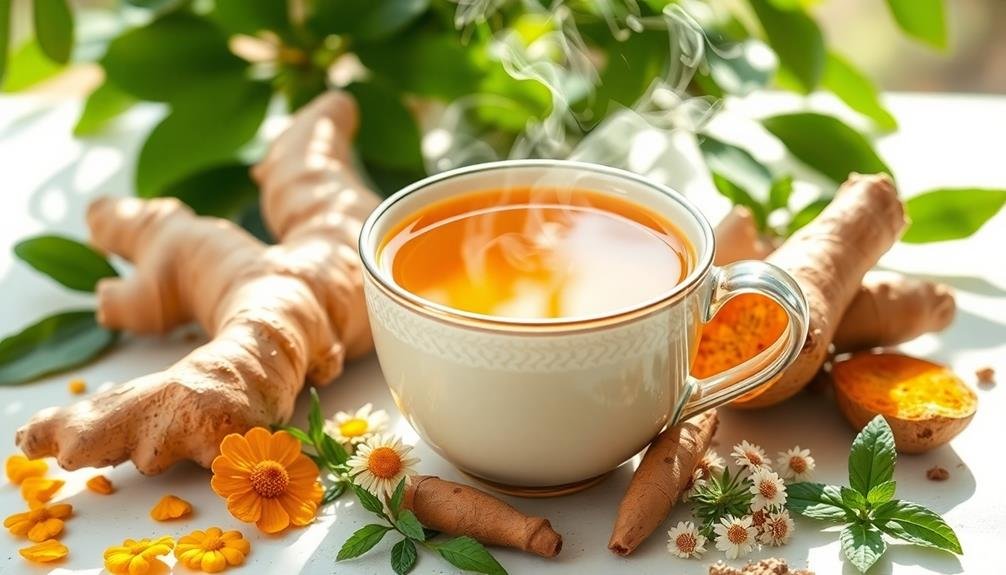
Enjoying a well-brewed herbal tea not only provides a comforting experience but also offers a range of health benefits that can enhance your overall well-being.
Beyond fighting inflammation, herbal teas can boost your immune system. Ingredients like echinacea and elderberry have long been celebrated for their ability to ward off colds and flu.
Additionally, many herbal teas are rich in antioxidants, which help combat oxidative stress in your body. This can lead to improved skin health, reducing signs of aging and promoting a radiant complexion.
If you're struggling with digestive issues, certain herbal blends, like peppermint and ginger, can soothe your stomach and promote healthy digestion.
Another significant benefit is their role in promoting relaxation and reducing stress. Chamomile and lavender teas are known for their calming effects, helping you unwind after a long day.
Regularly incorporating these teas into your routine can enhance your mental clarity and support emotional well-being.
Frequently Asked Questions
Can Children Safely Consume Herbal Teas for Inflammation?
Yes, children can safely consume certain herbal teas for inflammation, but it's essential to consult a pediatrician first. Some herbs might not be suitable for young ones, so always check for age-appropriate options.
How Often Should I Drink This Tea Blend?
You should drink this tea blend about two to three times a day for ideal benefits. Make sure to listen to your body, and adjust the frequency based on how you feel after consuming it.
Are There Side Effects From These Herbs?
Some herbs might cause side effects like digestive issues or allergic reactions. It's crucial to monitor how your body reacts, and if you experience discomfort, consult a healthcare professional before continuing use. Stay informed!
Can I Use Dried Herbs Instead of Fresh?
Yes, you can use dried herbs instead of fresh ones. They're often more concentrated, so you might need less. Just remember to adjust the quantities, as dried herbs have a stronger flavor and potency.
Is There a Recommended Storage Method for the Tea Blend?
To keep your tea blend fresh, store it in an airtight container in a cool, dark place. This method prevents moisture and light from degrading the herbs, ensuring you enjoy ideal flavor and benefits for longer.
In Summary
Incorporating a powerful herbal tea blend into your routine can be a simple yet effective way to fight inflammation naturally. By understanding the key herbs and crafting your unique blend, you're taking a proactive step toward better health. Remember to use proper brewing techniques to maximize the benefits. Enjoy your tea not just for its flavor, but also for its healing properties. Here's to a healthier, more vibrant you!

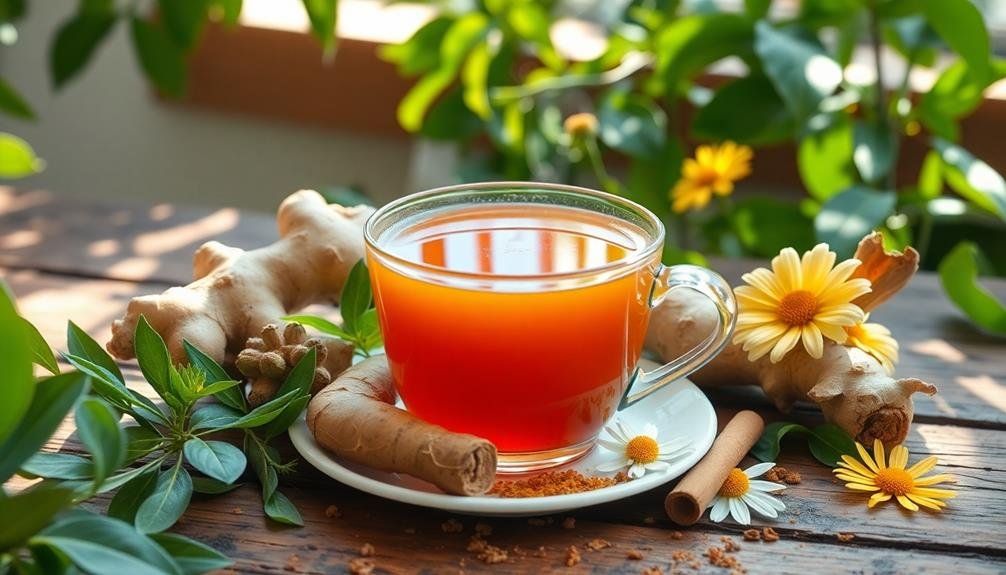
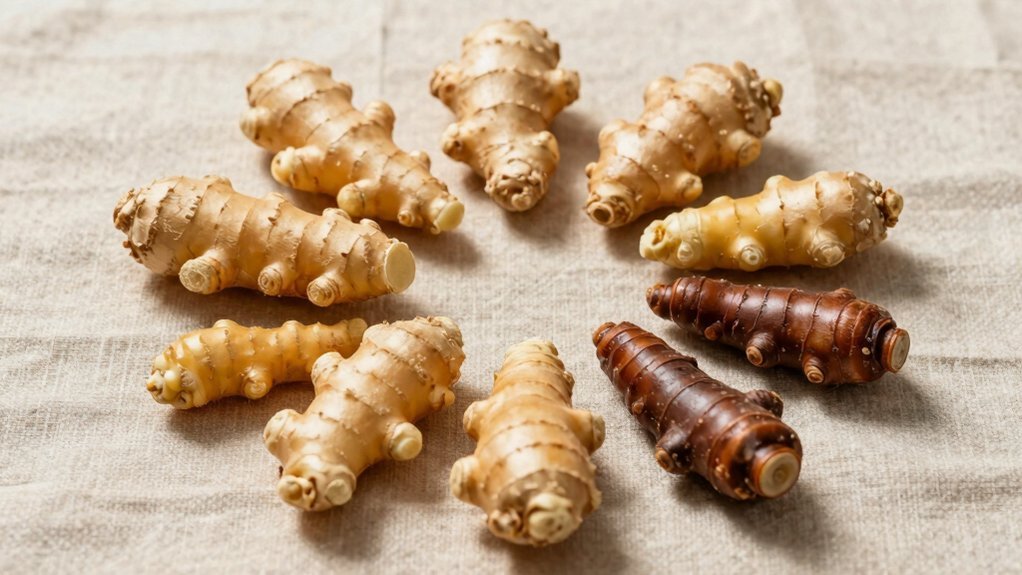
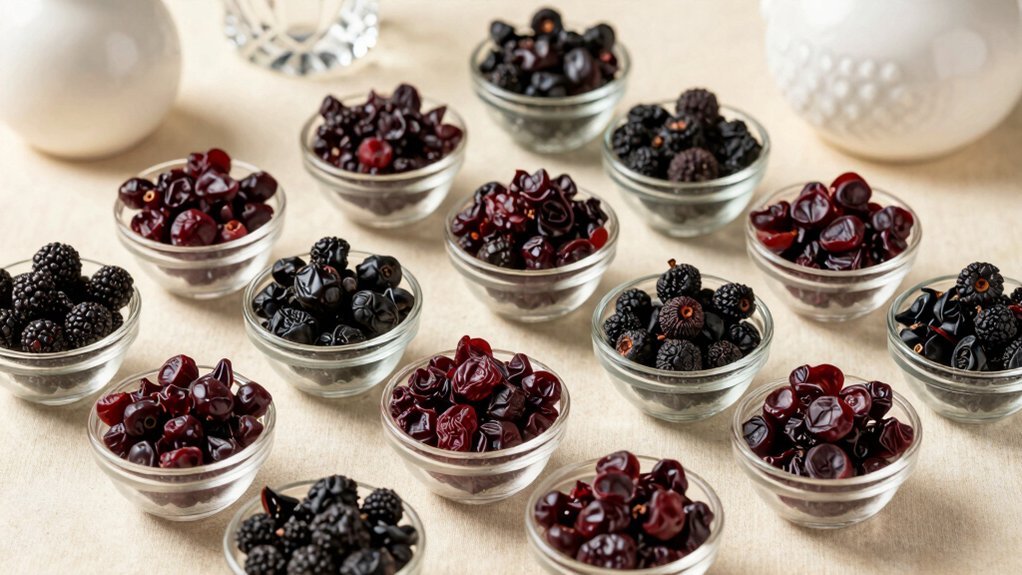
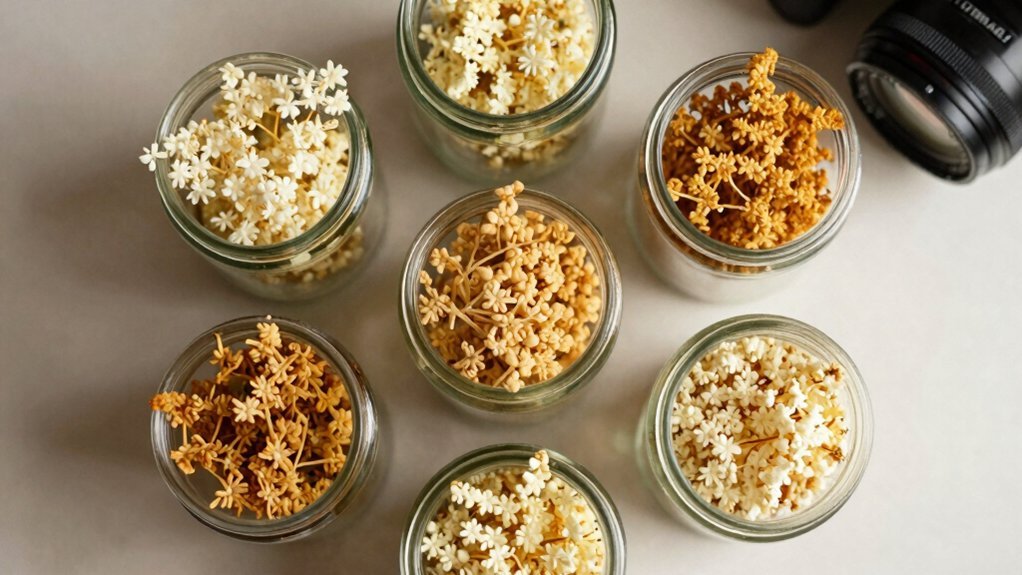
Leave a Reply